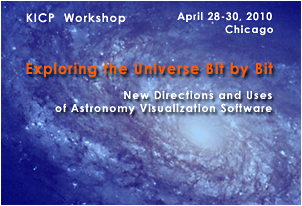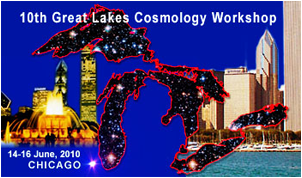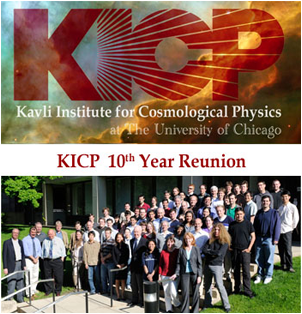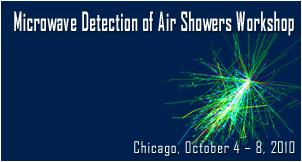| Home | Overview | Workshops & Conferences | Summer Schools | Visitors | Contact us | Logistics | KICP |

Workshops & Conferences
|
Workshops, 2010
2010 Exploring the Universe Bit by Bit Webpage New, visually rich, astronomical software environments coupled with large web-accessible data sets hold the promise of innovative and exciting ways to teach, collaborate, and explore the Universe. Exploring the Universe Bit by Bit will be a hands on workshop that will focus on four key visualization software environments: Google Sky, WorldWide Telescope, Celestia, & Partiview, with the immediate goals of developing applications and seeding new collaborations during the workshop. This interdisciplinary workshop is intended to bring together scientists, educators (formal and informal), and software developers to promote innovative uses of the emerging software platforms in scientific research and as tools for learning and teaching. With the help of developers of these applications, we will investigate their capabilities, strengths, and weaknesses; and identify future directions. A primary focus will be the creation of tours, classroom applications, collaborative research environments, and laboratory exercises during the workshop. These development efforts will be supported by mini-tutorials and one-on-one instruction by the creators of these products. The principal developers of Google Sky (Noel Gorelick, Andrew Connolly, and Ryan Scranton), WorldWide Telescope (Jonathan Fay), Celestia (Chris Laurel), Partiview (Stuart Levy) will lead the instruction. This workshop is modeled after the successful "Viewing the Universe:via the World Wide Web" workshop held at the University of Chicago in 2008.Learn more >> 10th Great Lakes Cosmology Workshop Webpage The Kavli Institute for Cosmological Physics (KICP) at the University of Chicago, and Alder Planetarium will host the 10th Great Lakes Cosmology Workshop (GLCW X) from Monday June 14th to Wednesday June 16th in Chicago, IL. As is tradition, the Workshop provides a forum for advanced graduate students, postdoctoral fellows, and young faculty from the Great Lakes region working on all areas of cosmology and particle-astrophysics. More senior faculty will provide useful overviews. The general structure of the workshop includes three days of workshops (6 half-day sessions), ending the evening of June 16th. The workshop's dinner banquet will be held on Monday, June 14, 2010 at the Adler Planetarium. In keeping with the goal of encouraging the broadest possible participation from young researchers in Great Lakes institutions, the scientific program has been largely driven by the topics which participants choose to present. It is preferred that presentations at GLCW X be directly relevant to one of the following topics: Dark Matter (direct and indirect detection); Dark Energy; Inflation; Large Scale Structure; Cosmic Microwave Background; Lensing; Galaxy Clusters; Dark Ages; Reionization; Dwarf Galaxies; Galaxy Evolution; BAO; Modified Gravity; 21 cm Emission.Learn more >> KICP 10th Year Reunion Webpage We are inviting our Alumni and their families back to KICP to reconnect with our colleagues and collaborators for a day of science, camaraderie and fun. The program will begin in the morning with science talks from current and former KICPers, ending at beautiful Promontory Point for Barbeque and games. We hope you and your family will join us!Learn more >> Microwave Detection of Air Showers Workshop Webpage Recent lab measurements suggest that the detection of microwave emission from air showers, caused by free electrons collisions with neutrals in the plasma left after the passage of the shower, can be used as a feasible technique to study ultra-high energy cosmic rays. This promising technique, if confirmed, would provide a calorimetric energy of the primary particle as fluorescence detectors in combination with a high-duty cycle and without the drawback of atmospheric attenuation (which requires continuous monitoring with specialized equipment). Several activities based on this potential detection method are now ongoing in the cosmic-ray community. The Kavli Institute for Cosmological Physics at the University of Chicago will hold a workshop in microwave radio detection of UHECRs. The objective of the workshop is to contrast ideas and current efforts while aiming towards an effective coordination of the different projects. Time will be dedicated to discuss the different approaches, simulation tools, and hardware solutions.Learn more >> |




